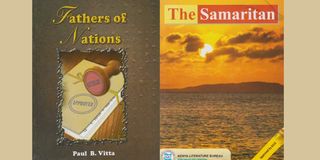Here come literature set books for Gen Z secondary students

Covers of set books Fathers of Nations and The Samaritan by Paul Vitta and John Lara.
Every few years, the Kenya Institute of Curriculum Development recommends set books for literature studies in secondary school. Often, there are controversies that the chosen titles are misplaced. They are either too difficult to understand or the themes tackled in the stories are out of sync with the intended readers.
Two current and compulsory texts, however, Fathers of Nations and The Samaritan by Paul Vitta and John Lara, respectively, are spot on. These books, which will be studied in secondary school literature for the Kenya Certificate of Secondary Education (KCSE) level up to 2026, render some modern themes that Gen Z readers can easily identify with such as the use of social media Applications (Apps) to bring societal change.
The two set books offer learners a panoramic view of themes currently bedevilling the modern African society and one can be forgiven for thinking that they were written by Kenyan writers.
Police brutality, abuse of office by the powers that be, greed for power, corruption and the unfortunate reality of poverty decades after independence are - some of the themes rendered by the two books. Other themes are class inequalities, ethnic profiling which at times turn fatal, environmental degradation, political intolerance, the devastation of drug abuse and vote manipulation among other themes. The novel explores how tribalism and nepotism can undermine national unity and exacerbate existing problems.
Fathers of Nations specifically explores how tribalism and nepotism can undermine national unity and aggravate existing problems.
As we come to the tail end of the 8-4-4 education system, hopefully, the 2025 and 2026 KCSE classes will be better informed after studying these books. As a mirror of society, literature equips learners with lifelong skills in understanding human nature. The proverbial leader of tomorrow will be better equipped to face life.
The play The Samaritan sits well with our Gen Z learners by exploring various technological advancements and their societal impact, including robots, self-driven vehicles and digital platforms. The play highlights the use of technology in clean energy, carbon emissions and information access.
The centrality of the technology in the play teaches learners how third-world countries like Kenya can leverage on the power of internet connectivity to solve ordinary issues affecting society. It is worth noting that Kenya has one of the most vibrant social media youth population on the continent. In a script familiar to us where some Kenyan youths have brought profound social change through technology, four characters in the Fathers of Nations, change the African technology narrative.
In The Samaritan, two students, under the guidance of their teacher, innovate an App, christened The Samaritan, which exposes the underhand dealings bedevilling operations in one municipality. In the ensuing exposure, leaders across the municipality are apprehended and answer to their wrongdoings.
The texts also bring to the fore the mental inclinations of some leaders who often go to extreme lengths in suppressing the freedom of expression of their subjects. For example, the fictional Nigerian president in the Fathers of Nations in a show of intolerance, imprisons his detractors. In a script familiar in many African states, this head of state uses the police to ban a pastor from the pulpit because pastor Chiamaka delivered a combative sermon that questioned some decisions made by the president after some riots rocked some regions of the country.
In The Samaritan, the leaders of Maracas municipality are not any better. They use coercion, intimidation, unlawful arrest and physical assault on the youthful but principled teacher Nicole as they attempt to kill the Samaritan App.
The common thread in these two set books is that often the will power to bring societal change is in ordinary citizens. This is evident in the Fathers of Nations where four men embark on an almost impossible task of making African heads of state agree to tackle poverty, disease, ignorance, impunity and corruption. The four have seen it all. They have witnessed how raw misuse of power donated by citizens to their leaders can kill dreams and render lives miserable. Against all odds, they emerge victorious.
In The Samaritan, an innovation by classroom teacher becomes a platform for all citizens to report corrupt dealings in the municipality. This leads to holding the municipality leaders to account and it brings meaningful change.
The Samaritan and Fathers of Nations will be studied up to 2026 before they are replaced. By then they will have changed the world view of millions of learners in secondary school. The heavy task of letting the loaded lessons in these books sink in our youths’ minds and turn them into critical thinkers rests on teachers of English and literature in our schools.
Moraa Nyakeyo is a teacher of English and literature at Nyabururu High School, Kisii. [email protected]

